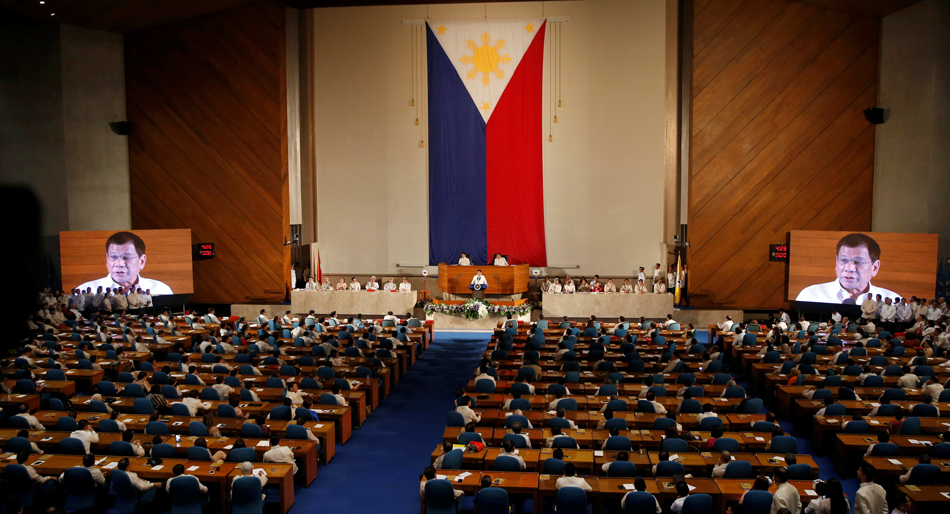Duterte now for constituent assembly to amend charter: Speaker | ABS-CBN

Welcome, Kapamilya! We use cookies to improve your browsing experience. Continuing to use this site means you agree to our use of cookies. Tell me more!
Duterte now for constituent assembly to amend charter: Speaker
Duterte now for constituent assembly to amend charter: Speaker
Christian V. Esguerra,
ABS-CBN News
Published Jul 28, 2016 02:25 PM PHT
|
Updated Jul 28, 2016 04:40 PM PHT
Duterte drops 'con-con', eyes federal shift via 'con-ass'
Duterte drops 'con-con', eyes federal shift via 'con-ass'
CHANGE OF HEART. President Rodrigo Duterte is now in favor of allowing sitting legislators to amend the Constitution as he eyes a shift to a federal-parliamentary form of government by 2022, House Speaker Pantaleon Alvarez.
CHANGE OF HEART. President Rodrigo Duterte is now in favor of allowing sitting legislators to amend the Constitution as he eyes a shift to a federal-parliamentary form of government by 2022, House Speaker Pantaleon Alvarez.
Duterte threw his support behind a constituent assembly during a meeting with Senate President Aquilino "Koko" Pimentel III and Alvarez Wednesday night.
Duterte threw his support behind a constituent assembly during a meeting with Senate President Aquilino "Koko" Pimentel III and Alvarez Wednesday night.
"Wag ho kayong mag-alala. Under the leadership of President Duterte, your fears under 'con-ass,' wala po yun. We committed to do it for the country," Alvarez told a forum of top businessmen in Makati City Thursday.
"Wag ho kayong mag-alala. Under the leadership of President Duterte, your fears under 'con-ass,' wala po yun. We committed to do it for the country," Alvarez told a forum of top businessmen in Makati City Thursday.
Duterte had earlier rejected a constituent assembly, saying he did not want incumbent legislators to revise the Constitution.
Duterte had earlier rejected a constituent assembly, saying he did not want incumbent legislators to revise the Constitution.
ADVERTISEMENT
But Alvarez said this mode is "cheaper and faster," noting that a constitutional convention would cost up to P7 billion.
But Alvarez said this mode is "cheaper and faster," noting that a constitutional convention would cost up to P7 billion.
Under the plan, Congress will draft a new Constitution within a year, then launch a massive information campaign on the proposed changes, Alvarez said.
Under the plan, Congress will draft a new Constitution within a year, then launch a massive information campaign on the proposed changes, Alvarez said.
The Speaker said the new Constitution will be presented in a plebiscite in 2019, coinciding with the midterm elections. By 2022, he said new leaders would be elected under the new Constitution.
The Speaker said the new Constitution will be presented in a plebiscite in 2019, coinciding with the midterm elections. By 2022, he said new leaders would be elected under the new Constitution.
FEDERALISM PITCH
Alvarez also underscored the need for a federal shift, telling business leaders that the unitary presidential system has hampered economic growth and contributed to inter-generational conflicts in the country.
Alvarez also underscored the need for a federal shift, telling business leaders that the unitary presidential system has hampered economic growth and contributed to inter-generational conflicts in the country.
He said the adoption of a federal government would allow local government units to provide tailor-fit solutions to their unique problems.
He said the adoption of a federal government would allow local government units to provide tailor-fit solutions to their unique problems.
"Through the adoption of a federal form of government, the division of national and state powers will be clearly delineated. The national government can focus on national concerns like defense, foreign policy, national police, monetary policies and others," he said.
"Through the adoption of a federal form of government, the division of national and state powers will be clearly delineated. The national government can focus on national concerns like defense, foreign policy, national police, monetary policies and others," he said.
"The states can focus on local concerns by empowering them to adopt tailor-fit solutions to their unique local problems -- no more imposition of 'one size fits all' policies and solutions from distant Manila, detached from the realities of the ground in far-away localities with unique problems and circumstances."
"The states can focus on local concerns by empowering them to adopt tailor-fit solutions to their unique local problems -- no more imposition of 'one size fits all' policies and solutions from distant Manila, detached from the realities of the ground in far-away localities with unique problems and circumstances."
The country's current unitary form of government mandates provinces to remit their income in the National Treasury. The national government also distributes and allocates the budget for each province.
Federalism, on the other hand, would allow each state to manage its own economy, natural resources and law.
The country's current unitary form of government mandates provinces to remit their income in the National Treasury. The national government also distributes and allocates the budget for each province.
Federalism, on the other hand, would allow each state to manage its own economy, natural resources and law.
ADVERTISEMENT
ADVERTISEMENT


